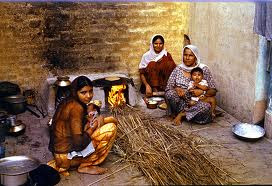The Earthen Stove (Chulla)
Most households in Punjab have this type of Stove (Chulla) as a secondary or primary source of cooking food. Chulla is made out of special type of clay. You don’t need natural gas or electricity, just fire up the stove with wood and dung cakes.
Hands that fashion tandoors
Modern kitchens have come a long way from the days of the earthen stove (chulla) to the present day microwaves. Despite the changes, importance and significance of tandoors has not diminished. They are still relevant and inseparable part of Punjabi culture. But we hardly give a thought to the hands that fashion them.
 “Hands covered with wet mud, sitting on the floor, sweat on her forehead, duppata tied tightly to cover her head, fingers trying to make something” portraits a clear picture of a tandoor maker.
“Hands covered with wet mud, sitting on the floor, sweat on her forehead, duppata tied tightly to cover her head, fingers trying to make something” portraits a clear picture of a tandoor maker.Since generations women of low-class families make tandoors while their rakshaks (their husbands) work as rickshaw pullers. Boys of the family work in mills and factories and a few interested girls of the family go out to study but none of them clean and sweep houses to make a living. Making tandoor is a means of livelihood for them; a small cottage industry.
However, they are concerned about their ‘art’. “We think this art of making tandoor is going to die soon as our daughters and even our daughter-in-laws are not interested in sitting in the sun, letting their hands get smeared with mud; for them this is just a waste of time.
These young girls can’t understand that this is our age-old art and work which has enabled us to live” said a tandoor maker.
They make tandoors in all sizes - from small to big. Small ones are sold for Rs 80 to 100 while the cost of medium and big ones varies between Rs 200 to Rs 250. Tandoors are not only made for local people but it is also exported and this made them proud for their art and profession. “We feel good that these big hotel people make use of our tandoors,” adds another woman.
But during rainy seasons they have to toil hard to save their tandoors from getting damaged. “When it rains and our tandoors get broken, although we try to save them by covering them with plastic sheet but many times it serves no purpose. We can’t take them inside our houses as we have very little space’ said another woman.
Generally tandoors bought by dhabas and hotel people and even by the housewives in two or three months. However, sometimes they have to wait long to sell them. She said earlier it was easy to run the family with the income generated by selling tandoors but now it had become hard now.
Fighting against poverty, miserable living conditions, and hunger, surviving against odds, trying to earn their livelihood and carry on with their tradition to making tandoors, these women display courage. Living in single rooms of mud, these women work hard to cope with their lives but there is no tension or sign of depression on their faces.
They are happy and contented with their simple life

